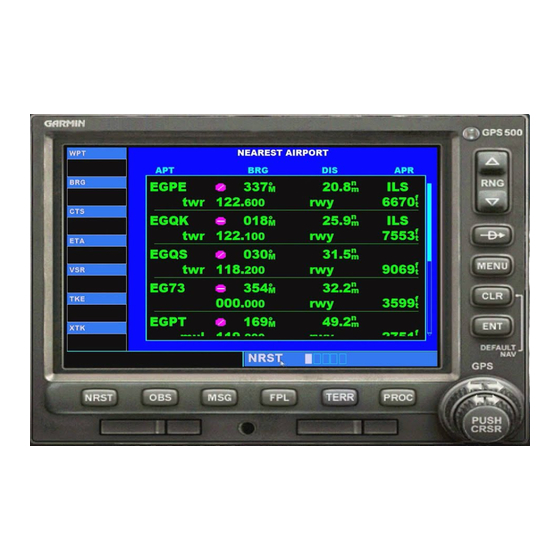1.3.6
LOC Specifications (GNS 530 Only)
Regulatory Compliance
Regulatory Compliance
(TAWS units only)
Receiver Audio Sensitivity
Course Deviation Sensitivity
Flag
AGC Characteristics
Selectivity
Spurious Response
Centering Accuracy
Audio Output
Audio Response
Audio Distortion
500 SERIES INSTALLATION MANUAL
190-00181-02
TSO C36e, JTSO-C36e, RTCA DO-195 Class A, EuroCAE
ED-46B
Annex 10 Volume I (Radio Navigation Aids) Par. 3.1.4
ETSO-2C36f
At -103.5 dBm (S+N)/N shall not be less than 6 dB.
-103.5 dBm or less for 60% of standard deflection.
The LOC Course Deviation Flag must be flagged:
a) in the absence of an RF signal.
b) When either the 90 or 150 Hz modulating signals is
removed and the other is maintained at its normal 20%.
c) In the absence of both 90 and 150 Hz modulation.
d) When the level of a standard localizer deviation test
signal produces less than a 50% of standard deflection.
From -86 dBm and -33 dBm input of a Standard VOR Audio
Test Signal, audio output levels shall not vary more than 3
dB.
Nose Bandwidth: The input signal level required to produce
the reference AGC voltage shall not vary more than 6 dB
over the input signal frequency range of ± 9 kHz from the
assigned channel frequency.
Skirt Bandwidth: The input signal level required to produce
reference AGC voltage shall be at least 70 dB greater than
the level required to produce reference AGC voltage at the
assigned channel frequency at ± 36 kHz from the assigned
channel frequency.
Greater than 80 dB.
Typical 0 ± 3 mV (Max error 9.9 mV per RTCA DO-195).
A minimum 100 mW into a 500 Ω load.
Less than 6 dB of Variation between 350 and 2500 Hz.
Except the 1020 Hz Ident Tone is at least 20 dB down in
voice mode.
The distortion in the receiver audio output shall not exceed
10% at all levels up to 100 mW.
Page 1-5
Rev S

